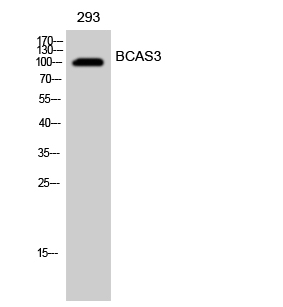BCAS3 Polyclonal Antibody
- Catalog No.:YT0465
- Applications:WB;ELISA
- Reactivity:Human;Mouse
- Target:
- BCAS3
- Gene Name:
- BCAS3
- Protein Name:
- Breast carcinoma-amplified sequence 3
- Human Gene Id:
- 54828
- Human Swiss Prot No:
- Q9H6U6
- Mouse Gene Id:
- 192197
- Mouse Swiss Prot No:
- Q8CCN5
- Immunogen:
- Synthesized peptide derived from BCAS3 . at AA range: 660-740
- Specificity:
- BCAS3 Polyclonal Antibody detects endogenous levels of BCAS3 protein.
- Formulation:
- Liquid in PBS containing 50% glycerol, 0.5% BSA and 0.02% sodium azide.
- Source:
- Polyclonal, Rabbit,IgG
- Dilution:
- WB 1:500 - 1:2000. ELISA: 1:5000. Not yet tested in other applications.
- Purification:
- The antibody was affinity-purified from rabbit antiserum by affinity-chromatography using epitope-specific immunogen.
- Concentration:
- 1 mg/ml
- Storage Stability:
- -15°C to -25°C/1 year(Do not lower than -25°C)
- Other Name:
- BCAS3;Breast carcinoma-amplified sequence 3;GAOB1
- Observed Band(KD):
- 100kD
- Background:
- developmental stage:Fetal.,disease:A chromosomal aberration involving BCAS3 may be a cause of breast cancer. Translocation t(17;20)(q23;q13) with BCAS4.,similarity:Belongs to the WD repeat BCAS3 family.,similarity:Contains 3 WD repeats.,tissue specificity:Stomach, liver, lung, kidney, prostate, testis, thyroid gland, adrenal gland, brain, heart, skeletal muscle, colon, spleen, small intestine, placenta, blood leucocyte and mammary epithelial cells. Overexpressed in most breast cancer cell lines.,
- Function:
- developmental stage:Fetal.,disease:A chromosomal aberration involving BCAS3 may be a cause of breast cancer. Translocation t(17;20)(q23;q13) with BCAS4.,similarity:Belongs to the WD repeat BCAS3 family.,similarity:Contains 3 WD repeats.,tissue specificity:Stomach, liver, lung, kidney, prostate, testis, thyroid gland, adrenal gland, brain, heart, skeletal muscle, colon, spleen, small intestine, placenta, blood leucocyte and mammary epithelial cells. Overexpressed in most breast cancer cell lines.,
- Subcellular Location:
- Nucleus . Cytoplasm . Cytoplasm, cytoskeleton . Preautophagosomal structure . Localizes in the cytoplasm in stationary cells. Translocates from the cytoplasm to the leading edge in motile cells. Colocalizes with microtubules and intermediate filaments in both stationary and motile cells (By similarity). Associates with chromatin. Recruited to estrogen receptor-induced promoters in a PELP1-dependent manner. The BCAS3:PHAF1 complex is recruited to the preautophagosomal structures adjacent to the damaged mitochondria upon mitophagy in a PRKN-PINK1 dependent manner (PubMed:33499712). .
- Expression:
- Expressed in stomach, liver, lung, kidney, prostate, testis, thyroid gland, adrenal gland, brain, heart, skeletal muscle, colon, spleen, small intestine, placenta, blood leukocyte and mammary epithelial cells. Expressed in undifferentiated ES cells. Expressed in blood islands and nascent blood vessels derived from differentiated ES cells into embryoid bodies (BD). Expressed in endothelial cells. Not detected in brain. Expressed in brain tumors (at protein level). Expressed in brain. Highly expressed in breast cancers and in glioma cell lines.
- June 19-2018
- WESTERN IMMUNOBLOTTING PROTOCOL
- June 19-2018
- IMMUNOHISTOCHEMISTRY-PARAFFIN PROTOCOL
- June 19-2018
- IMMUNOFLUORESCENCE PROTOCOL
- September 08-2020
- FLOW-CYTOMEYRT-PROTOCOL
- May 20-2022
- Cell-Based ELISA│解您多样本WB检测之困扰
- July 13-2018
- CELL-BASED-ELISA-PROTOCOL-FOR-ACETYL-PROTEIN
- July 13-2018
- CELL-BASED-ELISA-PROTOCOL-FOR-PHOSPHO-PROTEIN
- July 13-2018
- Antibody-FAQs
- Products Images

- Western Blot analysis of 293 cells using BCAS3 Polyclonal Antibody cells nucleus extracted by Minute TM Cytoplasmic and Nuclear Fractionation kit (SC-003,Inventbiotech,MN,USA).



